- Home
- Ellen Datlow
Echoes Page 8
Echoes Read online
Page 8
“Did they believe him?”
“Are you serious? It’s a ridiculous story, but Pelham thought he had enough clout in town to get away with it. Well, the book came out and whatever support he might have had vanished. He was sentenced to life. Died about ten years ago. A couple of gays bought the old Pelham house and turned it into a bed and breakfast. It’s some kind of homo Mecca at this point, which I think Christopher would have loved, if only because the rest of the city is thoroughly pissed about it.”
Scotty walked to the end of his Mercedes sedan and rested his butt on the trunk. He listened carefully for paws on the concrete before telling Reyna he would be staying in a hotel for a few days.
The growl leapt through the closed garage door, startling him. Scotty fumbled the phone and it bounced off his chest. He shot out his hand and felt a twinge of surprise when he caught the device. He’d never been particularly athletic. His moment of pride ended with another growl, sending him racing back for the utility room door.
• • •
My father is always there. He hides behind the faces of his friends, behind the eyes of his colleagues, behind the mouths of strangers who have never met him. He is the fat man I met on the beach who took me into a rickety shack so close to the road it shook when trucks passed; he is the beautiful young executive who led me into the woods behind our house and forced me to my knees; he is Carl Ramsey, the man my father trusted more than any other.
If I scrape away the layers of their skin, I will find my father hiding in these men. Or maybe I just want to find him there. To please him. To punish him.
He can’t be pleased.
• • •
Scotty packed a bag. His fear had formed from nothing rational: bits of coincidence, magnified anxiety, isolation, phantom noises, and perhaps too much vodka. Regardless of the fear’s unsustainable reasons, it had settled on him heavily after he’d fled the garage and ended the call with his assistant, so he shoved his overnight kit into the suitcase along with three suits and the other clothing he might need to get him through the week. He zippered the luggage and hoisted it from the bed.
When fresh scratching sounded at his front door, Scotty tensed, but he refused to entertain the illusion. He set the suitcase down in the hall outside his study and entered to gather his tablet and its charger.
Christopher Pelham’s outrageous book still lay on the floor. The scrabbling at the front door intensified. Scotty retrieved the book from the planks. He held it in his thick hand and stared at the cover, on which a young man and his dog appeared as shadows against a shimmering watery backdrop. The musky odor he now associated with a dog’s fur climbed into his nose, but instead of fading in an instant it remained. Scotty wrinkled his nose, attempting to dislodge the scent. His face and neck began to sting.
The book was the problem. Ever since he had taken the thing from Walter’s study, his life had unraveled in heavy loops.
Leaving the study with the book clutched tightly in his fist, he went to the stairs and paused as the claws on the door below reached a frantic pace. He imagined Christopher Pelham’s dog, the black shepherd named Bette, attacking the wood, trying to get into his house with the same ferocity she had once used to attempt escape from the Pelham’s pool house.
Then his mind created more disturbing pictures: the dog’s muzzle buried deeply in the crimson pulp of her master’s neck, her tongue lapping blood and loosening scraps of tissue, making them easier for her teeth to take hold.
His phone announced yet another call from his daughter. Like a slap to an already stinging cheek, the sound pulled him from reverie.
Scotty stepped heavily on the top stair and then the next. The call ended as he reached the entryway. The nails on wood, only ten feet away, had taken on the volume of a threshing machine. The song from his phone started again.
At the fireplace, Scotty set the book on the mantel and answered the call.
“Miranda, I do not have time for this right now.”
“Mr. Collins,” a low male voice responded.
The attack on his front door ceased. In its place came the clicking of a dog’s overgrown nails on the second-floor hallway. He whipped his head upward and followed the progression along the ceiling. The sudden relocation of sound wasn’t possible, but the tick-tick of a dog’s paws was as clear in his ears as the pounding of his pulse.
“Mr. Collins? This is James Zyler from Eastbrook Correctional.”
“I don’t . . . ,” Scotty began. “Excuse me?”
The man repeated the information as Scotty continued to track the clicking on the floorboards above.
“It’s about your daughter,” Zyler said. “There’s been an incident.”
“Define ‘incident,’ ” Scotty said.
“Miranda was assaulted this afternoon. We don’t have all the details just now.”
“What happened to my daughter?” Scotty asked, head still cocked toward the ceiling.
“She’s in critical condition,” Zyler said. “She’s experienced multiple stab wounds. I’m very sorry to have to give you this news. I can tell you more when you arrive.”
Disbelief was Scotty’s first reaction to the news. Miranda had mentioned a debt she owed another prisoner, but Scotty had taken care of that, the way he’d taken care of everything. He’d wired money into her inmate account. She should have had no problem clearing the debt.
Except he hadn’t wired the money.
He’d been caught up in damage control after the news about Walter broke across the internet. He’d intended to wire his daughter the money, but he’d never done it.
“I’ll be there as soon as I can,” Scotty said.
Zyler kept talking, but Scotty was no longer listening. He lowered his head and turned to the mantel. He exchanged the phone for the paperback novel.
The thing had to burn.
He pressed the button on the wall beside the fireplace and flames leapt through the vents in the gas pipe, rising high and furious around the fake, ceramic logs. Above him, the clacking of nails grew fierce, sounding as if the animal were attempting to change its direction rapidly and slipping on the polished floor in the process. He opened the cover of the book and read the inscription.
At first he didn’t notice the change in the wording. Reading over it quickly, he saw Walter’s name, because he’d expected to find it written there. But the inscription had transformed, and Scotty’s organs twisted and coiled into knots when the altered phrase became clear.
To Scotty,
Who was like a second father to me. Chris.
At his back, Bette ran down the stairs, carrying her scent into the room.
Scotty turned from the fireplace, weighted with dread. The sight of the dog, or what had once been a dog, struck him with disparate emotions. The first, most prominent feeling was one of terror. The black shepherd crouched in his foyer. Though not transparent, the body appeared not quite solid, and the edges of the animal feathered away, rising, narrowing, and fading like ink in water. Its bared white fangs looked too large for the smallish head. Its black eyes, silken eyes, locked on him hungrily. But despite the lethal appearance of the beast, Scotty found the creature darkly beautiful. This conflicting emotion confounded him, but he couldn’t deny it. The urge to call it to him, so that he might stroke the uncommon fur, played like a melody at the back of his mind.
Bette barked savagely, crouching lower in the entryway.
His desire to summon the dog vanished, and Scotty spun. But where to go? He couldn’t hope to outrun the beast in the house. The fucking thing was built for speed and he wasn’t. He wouldn’t make it to the dining room before the dog caught him. Canceling his attempt to flee he danced awkwardly backward, suddenly flummoxed as to how to protect himself against the animal. Then the jaw clamped on his wrist and the remaining fragments of rational thought whirled away.
He screamed and attempted to pull his arm back, but Bette yanked, sending him off balance. He threw out his left hand to stea
dy himself on the mantel. Christopher Pelham’s novel dropped to the floor.
Amid his panic, Scotty realized the sensation on his arm was as wrong as everything else about this moment. The first sensation was one of pressure, as if his wrist and lower arm had been caught in a vice. Moments later, a second sensation joined the first. Now, he felt the teeth in him, but it wasn’t a piercing sensation. The fangs seemed to lengthen and deepen within him as if forming under his skin. Regardless, the pain was agonizing.
Bette shook her head violently. Pain radiated from his wrist to his shoulder, where a blossom of pure agony erupted as the dog dislocated his arm from the socket. The pop filled Scotty’s head for a moment. Nausea followed. As he struggled with the animal, his stomach lurched, and he vomited on the floor, spattering the animal in the process. Bette released the arm, backed away, her nails clicking noisily on the hardwood floor. The heaving persisted. His body cramped, and his head began to swim. Scotty dropped to his knees and clutched his wounded arm.
He lifted his head to check on the dog, but she seemed to be done with him for the moment. She sat calmly with wisps of ethereal blackness pulling away from her beautiful face as she eyed him.
Tears blurred Scotty’s vision. Loud moans, rhythmic and deep, escaped his throat as he rocked back and forth on his knees, in a primal response to the pain. The room teetered and then spun. Scotty lowered himself to the floor and lay on his side to combat the sickness and vertigo.
“You fuck,” he cried.
He wasn’t speaking only to the dog. He also spoke to Christopher Pelham. He knew that Pelham existed in this animal form, perhaps sharing it, perhaps simply wearing it as a disguise.
Bette’s head cocked to the side. Her mouth opened and a long black tongue lolled out. She took a step forward and then another. Her muzzle hovered above his face. Scotty trembled beneath the mouth. Prayers died in his throat.
The dog’s head dipped low, and Scotty gritted his teeth in preparation for what he could only assume was a killing bite. The tongue pressed into Scotty’s cheek, but he did not feel a tongue. More than anything the sensation on his cheek was like a hard knuckle drawing a line up his face.
A second lick was softer. It almost felt soothing, more like the actual tongue of a dog.
Scotty tried desperately to roll away, but only got as far as his back. Once he placed weight on the dislocated shoulder, a shock of pain caused him to gray out.
He came to seconds later beneath Bette’s tongue. He screamed again and then fell into hopeless sobbing.
What was the animal waiting for? If she wanted him dead, why didn’t she just do it? It wasn’t as if she had to play loyal, the way she had with her master, and wait for Scotty to dehydrate or starve.
Except this wasn’t just the dog, Scotty thought. Pelham was part of this spectral monstrosity. And he had dehydrated. He had starved.
The hunger started as a tickle in Scotty’s belly, and then it exploded like a punch. Bette continued to taste his neck and cheeks, and with each lap of her tongue, the hunger grew more painful. Scotty’s eyes clouded with tears and weakness. The anguish in his arm was now matched by the pain in his stomach. He cried out again and began to pray that his heart would stop or a vessel would burst in his brain or the bites on his wrist would bleed out.
The pain radiated through every nerve in his body, and Bette licked his face like the good dog she was.
• • •
I’ve never known hunger. Maybe I never will, but I’ve experienced abandonment. I feel certain both produce a similar sensation: an aching emptiness. Even though I lived under the same roof as my father, I felt his absence. At least, his absence from me.
A runt never knows the sincere embrace of a parent, experiencing only its empty and perfunctory counterpart. A runt can never hope to please its parents, because they have already labeled this particular offspring fruitless tissue, a lesser thing, a disposable error in genealogy.
So I escaped to the city, and I found it full of runts like me. They understood the hunger, understood the deprivations. We gathered together for entertainment and huddled together for warmth. We nourished one another, and there was joy. There was love.
As the litter’s runt, I was denied much, but I grew stronger fighting for these petty, missing things. And now I don’t need them any longer. I’ve found what I need in the city. I’ve found my protection. I’ve found my pack.
The July Girls
Alison Littlewood
Sophia didn’t knock. It was my room—I’d even put a sign on the door—but she seemed to think she owned everything. People who looked like Sophia always did. I was lying on my bed, reading a school textbook by lamplight. Outside its glow the room was dim, but her hair still shone gold. All that glitters . . .
She twisted her lip into a sneer, and I wondered what she’d say if I told her it made her look ugly. But then she tossed her head, sending ripples of light along that hair, and I was silenced. Oh, how I loved that hair—though I never would have told her. Mine was dull, average length, and an average colour: mouse. Her name for me.
“Aw, is ickle mousy working? Hasn’t ickle mousy any fwiends?”
I had no answer, but she didn’t wait for one. She crossed to my window and tugged the curtain aside, peering out into the dark. I knew what she was up to. Mine was the room which overlooked the extension. From the window she could run across its flat roof, jump down onto the banking at the back of the house and slip out of the back gate. Someone would be waiting for her. They always were: someone tall with broad shoulders, most likely wearing a leather jacket and holding the keys to a car. She never was alone. She probably wouldn’t know how to be.
She turned. I could have spoiled everything for her then, but I didn’t call out. Still, even when she ought to have been nice to me, she couldn’t help herself.
“Aw, maybe one day you’ll find an ickle boy mouse to play with. Won’t that be nice?”
She swung her tanned, shapely leg over the sill, ducked under the window frame, and was gone. I heard the scrape of her feet on the flat roof, and then nothing.
I’d like to think I kept silent for her out of some sisterly conspiracy, but I can’t pretend. What went through my mind was: I hope you get pregnant. If you want to ruin your life, I don’t give a shit. And then—I could remember the thought as clearly as if I’d spoken it—At least this means you’re gone.
• • •
The house changed after Sophia died. Mum and my step-dad went quiet. The rooms went quiet too, only the dust seeming to move, turning in on itself while time did the same. Familiar objects, tainted by the atmosphere, went stale somehow, as if they belonged to a world that moved more slowly than it should. But the biggest change of all was that I could breathe again.
The same wasn’t true of my mum or Sophia’s dad, and I hid it from them, though I felt my inner self expanding, uncurling from whatever tight ball I’d been hiding in. Then they told me about the holiday, and I wondered what they thought that could fix; but I smiled at the thought of Cornwall’s busy little harbours and the salty taste of chips and the sunlight on skin that would not grow cold like hers, that would not turn grey as hers must have, laid out on a mortuary slab. Whatever skin she’d still possessed, anyway.
It was Sophia’s dad who told me we were going. He sidled into my room, as if he was ashamed of being alive when his daughter was dead. He didn’t even look into my face, turning instead towards a shelf, running one finger along its edge. “I have some news,” he said. “It’ll be great.” And his finger stopped moving and he stared and didn’t say anything else. He reached out and picked something up from the back of the shelf; it was unwieldy, and he teased it out from behind my old teddy bear.
It was a picture frame. Two girls stared out from a photograph: one of them with sleek blonde hair, beautiful, slender; and me. For a moment I might have been there again. It was taken on Sports Day at school. She’d been picked for the hundred-metre sprint, while I’d have b
een lucky to do an egg and spoon race. Our smiles looked the same, but we weren’t smiling at each other. She’d been making eyes at her current crush, sitting a short distance away, and I was smiling because someone had told me to.
When her dad turned towards me, tears were brimming at his eyes. “What a lovely picture. I had no idea. . . .”
He smiled at me, and this time he saw me—really looked at me, I think, for the first time in weeks. And he told me about Cornwall. “We’ll relive some old memories,” he said, “and—and we’ll enjoy them. Just the three of us.” He grasped my hand then, squeezing my limp fingers, and he left me to stare at the photograph he’d replaced on my shelf. I didn’t have the first idea how it had come to be there.
He obviously thought I’d chosen it, but I never would have and neither would she. I moved to put it under the bed—or in the bin—and I saw again the way he’d lifted his gaze to me, warming to me, and instead I put it back on the shelf. I didn’t face it toward the room, though, where I’d have to look at it. I turned it towards the door, where anyone would notice it as they came in.
• • •
The long queue of traffic on the A30 gave way to single track lanes, walled in by tall hedges thick with flowers and birdsong. We wound our way along them, hardly seeing anyone; we only had to back up once, to allow a tractor to pass. Most tourists stayed by the coast, but my family had always preferred this rural backwater, a drive away from the beaches and cafés and crowds. I preferred it too, though Sophia hadn’t. I could almost see her scowling out of the back window in disgust, all the way to the little rose-bound cottage.
Mum came in while I was unpacking, shoving T-shirts into empty drawers, finding space in the wardrobe between an ironing board and spare blankets. She didn’t say anything, only sat on the bed and looked at me as if we had just met and she wanted to size me up, and she smiled.
I pulled a hoodie from the top of my suitcase and her smile faded at the sight of what lay beneath. “What’s that?”

 Inferno
Inferno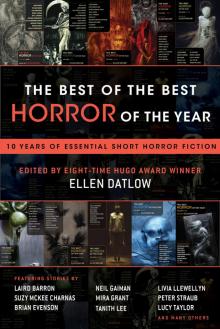 The Best of the Best Horror of the Year
The Best of the Best Horror of the Year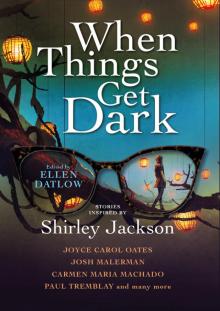 When Things Get Dark
When Things Get Dark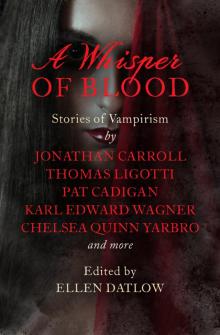 A Whisper of Blood
A Whisper of Blood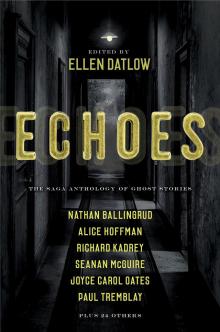 Echoes
Echoes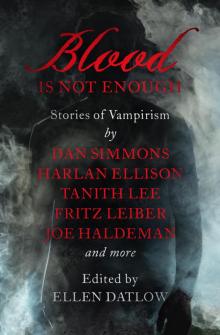 Blood Is Not Enough
Blood Is Not Enough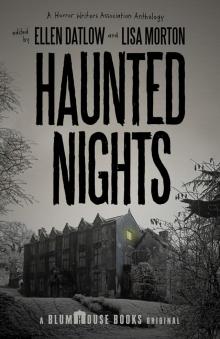 Haunted Nights
Haunted Nights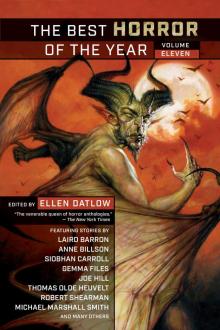 The Best Horror of the Year Volume Eleven
The Best Horror of the Year Volume Eleven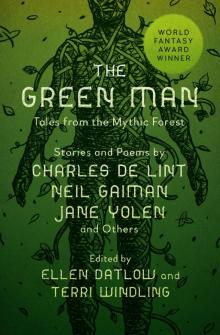 The Green Man
The Green Man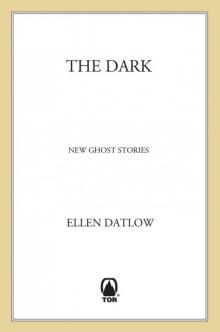 The Dark
The Dark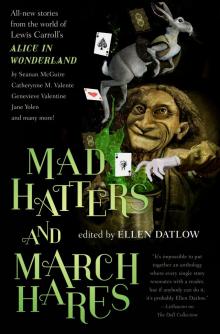 Mad Hatters and March Hares
Mad Hatters and March Hares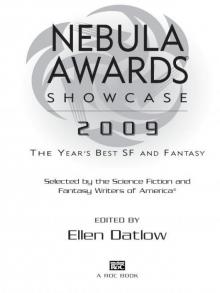 Nebula Awards Showcase 2009
Nebula Awards Showcase 2009 The Devil and the Deep
The Devil and the Deep